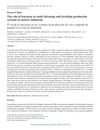Leucaena Leucocephala: A Nutritional Profile
September 1995
in “
Food and nutrition bulletin
”

TLDR Leucaena leucocephala is nutritious but needs careful processing to remove toxins.
The document "Leucaena Leucocephala a Nutrition Profile" from 1995 detailed the nutritional benefits and toxicological challenges of using Leucaena leucocephala as animal feed and human food. It highlighted the presence of mimosine, a toxic amino acid causing alopecia, growth retardation, and other health issues, particularly in non-ruminants. Various detoxification methods, such as heat treatment, microbial introduction, and fermentation, were explored to reduce mimosine content. Despite its high protein and essential amino acid content, careful management was necessary to mitigate its anti-nutritional factors.



